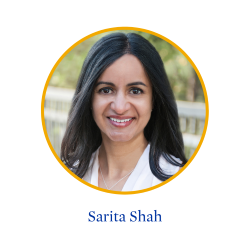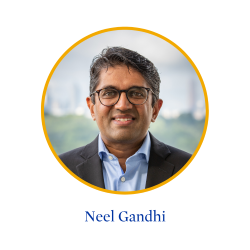Epidemiology Professors Continue to Be Awarded NIH Midcareer Mentoring Awards

By Karina Antenucci
The National Institutes of Health (NIH) Midcareer Investigator Award in Patient-Oriented Research (K24) is a somewhat rare award at Emory University. Currently, there are six professors who have been awarded one, four of whom are in the Rollins School of Public Health’s Department of Epidemiology: Sarita Shah, MD; Tené T. Lewis, PhD; Alvaro Alonso, MD; and Neel Gandhi, MD. Shah received her award this year.
“The Department of Epidemiology has an excellent group of mid-career scholars who are not only outstanding researchers but also mentors, and that is what the award recognizes,” says Timothy L. Lash, DSc, chair of the department.
About the NIH Midcareer Mentoring Award
The K24 award’s purpose is to provide up to five years of support to mid-career health-professional doctorates, who are typically at the associate professor level, for protected time for patient-oriented research and mentoring junior clinical investigators. The award can be renewed for another five years.
“Devising this mechanism that bridges research and training grants and addressing it to midcareer faculty was a stroke of genius on the part of the NIH. I am delighted that faculty have taken advantage of this award,” Lash says.
Supporting Education and Research
Lash notes that it is reflective of the Department of Epidemiology’s viewpoint that individuals can be successful at both education and research—and that they are in fact synergistic—instead of choosing between the two.
“Each of our faculty awardees have an outstanding list of students, early-career faculty, and postdocs with whom they have worked and who are now themselves successful scholars or public health practitioners,” Lash says. “This comes from having a body of research and an area of scholarship that has outstanding potential where people can grow their careers in a highly supportive environment.”
Additionally, a collaborative ecosystem conducive to mentorship is woven into the fabric of Rollins. The school’s evidence-based mentoring program helps early-career faculty progress through the stages of establishing an independent research program. “The mid- and late-career faculty are really aware of how to support, mentor, and help more junior faculty to be more successful,” Lash says.
What K24s Mean for Mentorship

Shah applied for the award because of her love of mentoring. Having had impactful mentors herself and wanting to pay it forward, she has mentored since the early days of her 17-year career.
Her research and public health work have focused on drug-resistant tuberculosis (TB) and TB/HIV co-infection throughout sub-Saharan Africa and Asia. Shah’s K24 award, “Mentoring Multidisciplinary Patient-Oriented Research in TB, HIV, and Global Health,” will leverage an ongoing NIH R01-funded study investigating drug-resistant TB transmission in South Africa, including the impact of the COVID-19 pandemic on social contact patterns that are a key factor in disease spread. She will also be expanding her research to include more advanced molecular genotyping methods, which are a crucial tool for understanding infectious disease transmission. This grant is a natural extension of what Shah already does, she says. However, the funding will cover the hours she spends mentoring without having to borrow time from the primary scientific objectives of her research.
“Mentoring is a discipline. There’s a way to do it well. I haven’t been able to focus as much as I’d like to on building my own skills as a mentor, so really having the protected time to develop these skills is exciting and appealing to me,” she says.
Shah mentors six to eight early-career investigators, doctoral, and Master of Public Health students per year, and meets with mentees once or every other week for an hour. Each mentee typically works with her for a few years and then cycles out.
“We’re really lucky at Emory with our networks to have a huge pool of trainees looking for mentors,” Shah says. “The interest in infectious disease epidemiology has skyrocketed over the past several years, so there’s a critical need for mentors with expertise in this area.”
More Examples of Faculty K24 Awards
Lewis’ overall body of research is focused on understanding the psychological and social contributors to Black-white disparities in cardiovascular disease (CVD)—the leading cause of death in the United States—in women. Only 5% of the research funded by NIH focuses on social and/or behavioral sciences, which is why she believes this area is critically important.
The research proposed in her K24, “Mentoring and Patient-Oriented Research on Social Exposures and CVD Risk in Underrepresented Women,” is designed to understand the extent to which psychological and social factors might contribute to ovarian aging and whether it might cause early markers of cardiovascular disease in African American women. She notes the mentoring component of her K24 as having been a “game changer” in giving her the time and space to create a community of more junior researchers who represent the next generation of health equity scholars.
“I mentor scholars on topics that are held to an incredibly high, and in my opinion, sometimes unfair, bar for funding. This requires a high degree of rigorous scientific mentoring, plus a lot of social and emotional support just to manage the stress related to the often-necessary multiple submissions. But I view this as crucial to capacity building because some of the most pressing public health problems of the past decade—from cardiovascular disease, to COVID, to cancer—are strongly impacted by psychological and social factors,” Lewis says.
 Gandhi was awarded a K24 in 2014 and, in 2019, he was successfully able to renew the award, “Mentorship in Patient-Oriented Research in Tuberculosis, HIV and Global Health,” for another 5 years, through 2024. TB is the leading cause of infectious disease death globally, and accounts for four out of 10 deaths in HIV-infected individuals.
Gandhi was awarded a K24 in 2014 and, in 2019, he was successfully able to renew the award, “Mentorship in Patient-Oriented Research in Tuberculosis, HIV and Global Health,” for another 5 years, through 2024. TB is the leading cause of infectious disease death globally, and accounts for four out of 10 deaths in HIV-infected individuals.
His first K24 supported mentorship for 33 trainees, produced 36 publications (including 26 with a mentee as first author), and allowed Gandhi to expand his research program substantially to include molecular epidemiology, TB immunology, and clinical trials. The renewal award allows him to continue to expand on this work, including facilitating a pilot epigenetic study, in addition to further enhancing his mentorship and leadership skills. It also will provide numerous training opportunities for the next generation of scientists to carry out their own innovative research projects.
Interested in Applying for a K24?
Shah advises that timing is crucial. You must be established enough as an investigator but still be considered “midcareer,” which for some of the NIH institutes means at an associate professor level. She notes having to submit her application twice, and the process taking 1.5 years from the initial submission to the notice of funding. Plus, having active research grants tied to the mentoring award is crucial while trying to obtain it.
“There are so many Emory faculty who are doing research and mentoring. This grant is a great opportunity to have support while doing both, but it requires some planning that can make it a challenge,” Shah says.
She adds, “There should be more awards like this! I hope that in the future there will be eligibility for people at the full professor level. In fact, you probably devote even more time to mentoring when you become a full professor, so it seems even more important to have the protected time for supporting trainees interested in clinical research careers.”


